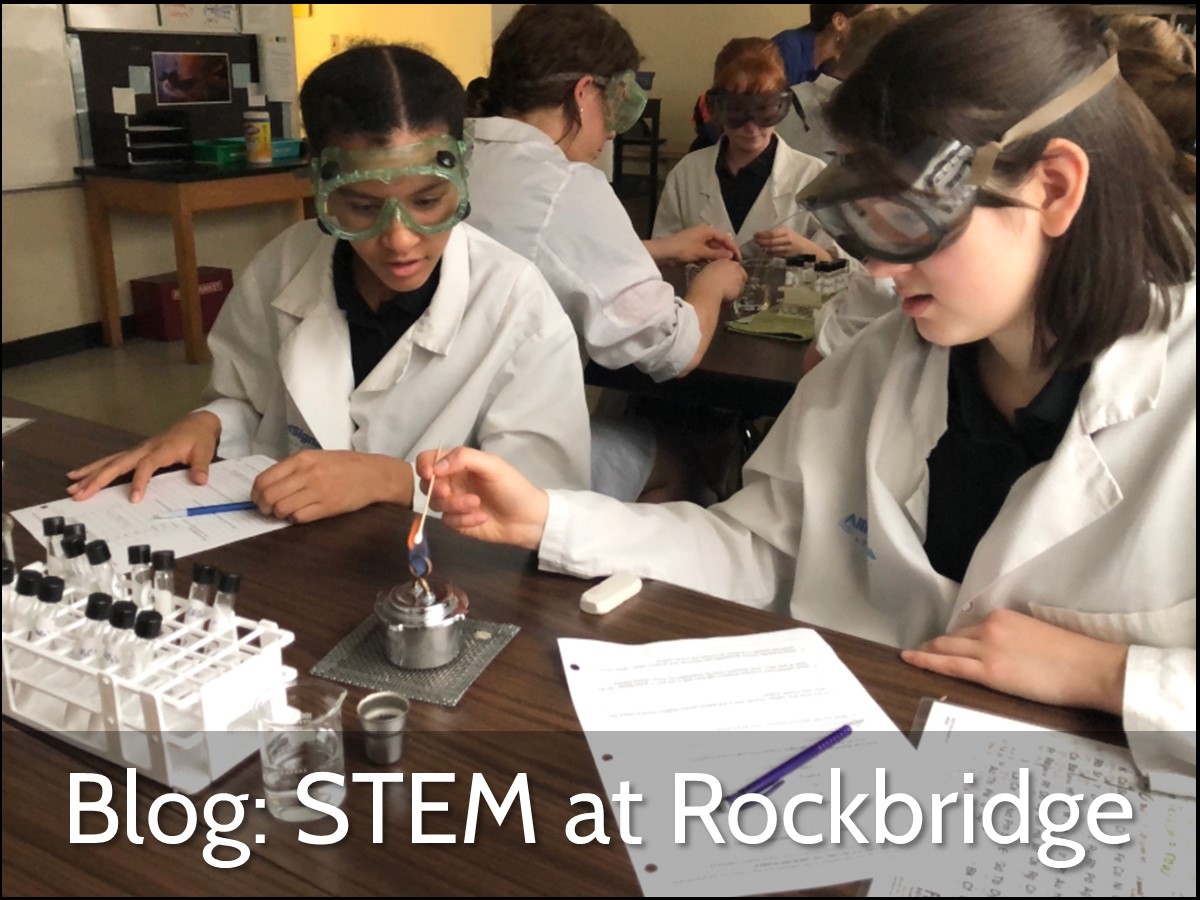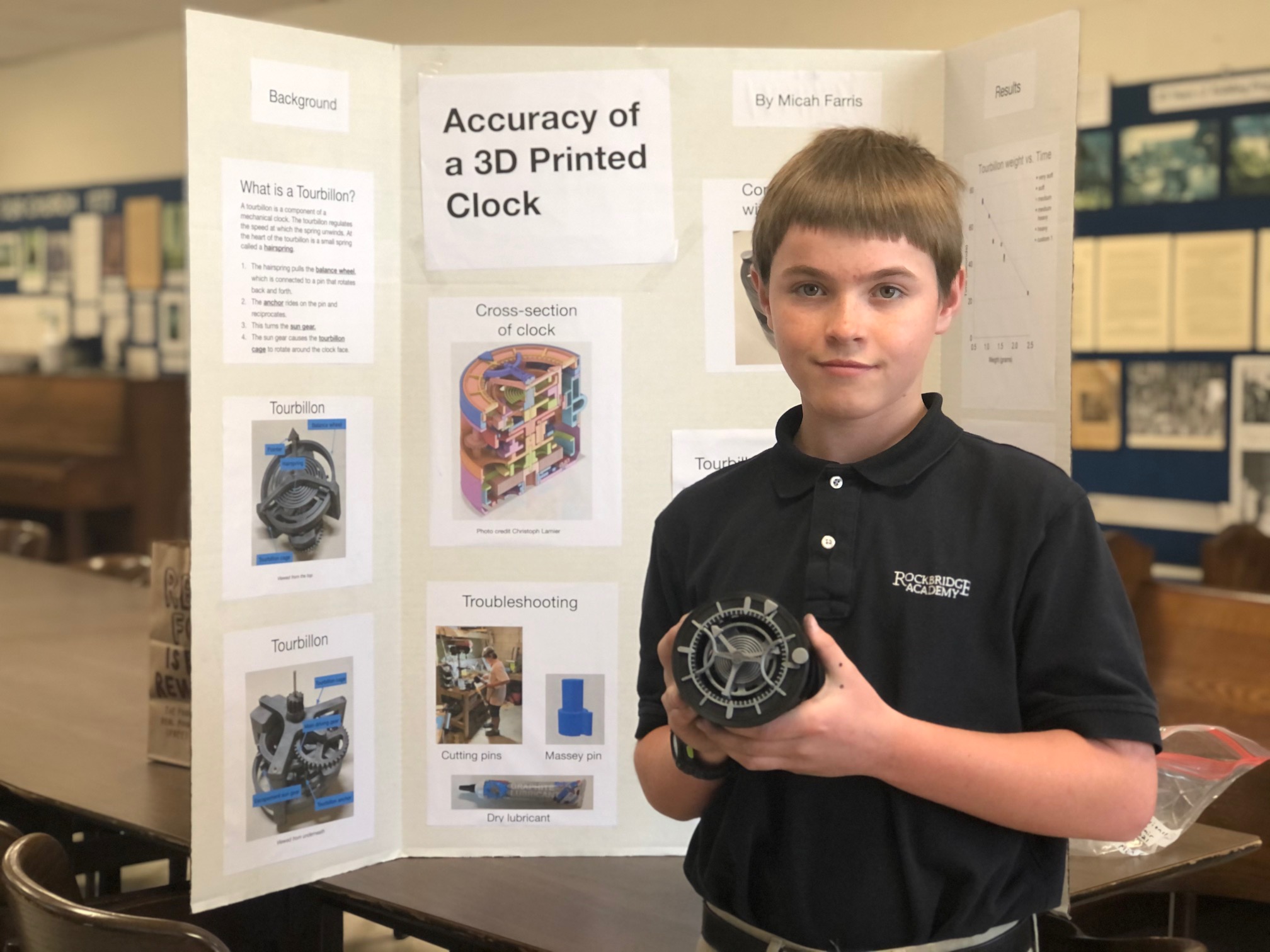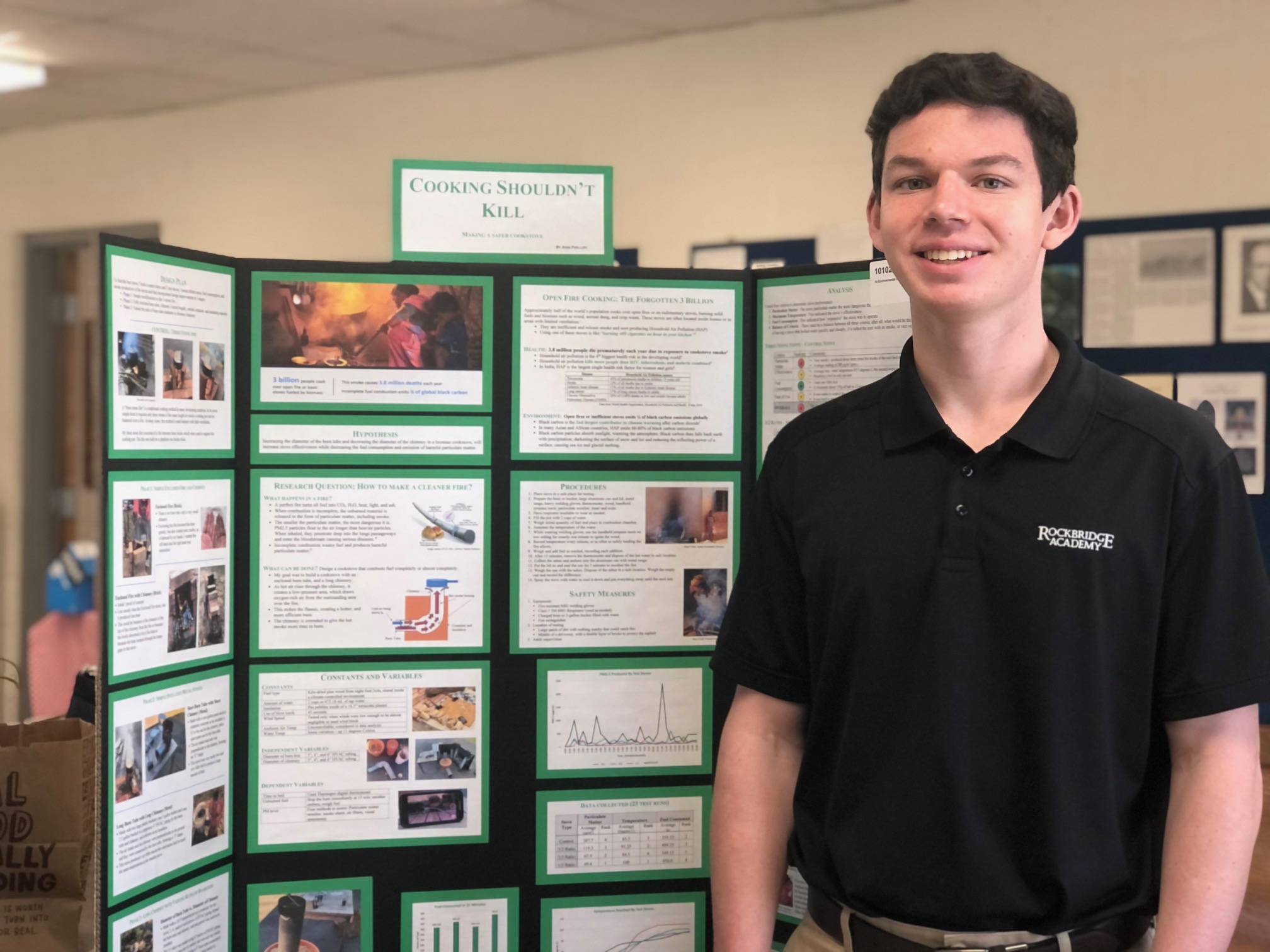Rockbridge Academy Blog
STEM at Rockbridge Academy

Eighth-grader Theodore Grev had a problem. Every time he camped, his sleeping hammock gave him trouble. Setting up at night in the woods, he couldn’t see to secure the knots for his tarp covering. Sometimes the tarp would blow away in the middle of the night, leaving him cold and wet.
Something had to be done.
When he saw the invitation for the Rockbridge STEM Club (Science, Technology, Engineering, and Math), Theodore decided to turn his problem into a science project. Quarantining at home during the summer COVID shutdown, he built one configuration after another, carefully recording the amount of time it took to set up each model. He finally settled on the best one: it took 8 minutes and 30 seconds to assemble and stayed up all night without fail. This winter, he entered it the Regional Science and Engineering Expo. He and his friends have also started using it on their camping trips, with great success.
Theodore is just one of several participants in the STEM Club at Rockbridge Academy.
Other projects this year have included creating an accurate clock with a 3D printer; designing a walking robot; building a low-pollution cooking stove to save lives in the third world; and testing the safety of personal passwords. The club’s record is strong. Last year, freshman Josh Phillips took home 6 awards for his “Cooking Shouldn’t Kill” cookstove design. The year before that, junior Ryan McDowell took his computer security project to the Intel International Science and Engineering Fair (ISEF) and won a “Cyber Pioneer” honorable mention from the National Security Agency.
 How does this work at a classical, Christian school of only 165 middle and high school students? As STEM fields are promoted more heavily in the culture, classical, Christian schools—usually much smaller than their public counterparts—are often questioned about their ability to measure up.
How does this work at a classical, Christian school of only 165 middle and high school students? As STEM fields are promoted more heavily in the culture, classical, Christian schools—usually much smaller than their public counterparts—are often questioned about their ability to measure up.
At Rockbridge Academy, the curriculum includes a strong STEM track of earth science, biology, chemistry, and physics; algebra, geometry, trigonometry, and calculus; and analytical science and logic, which train students to test arguments and formulate proofs. For several years, Rockbridge students have also participated in the American Math Competition and regional and state-wide Science Olympiads, placing well in both.
The study of science and math is historically classical and Christian—grounded firmly in the liberal arts and driven by a desire to comprehend Creation. Classical educators like to quote Apple founder Steve Jobs: “Technology alone is not enough…it’s technology married with liberal arts, married with the humanities, that yields us the result that makes our hearts sing.”
“Technology alone is not enough…it’s technology married with liberal arts, married with the humanities, that yields us the result that makes our hearts sing.” Steve jobs
At Rockbridge, watching students at work DOES make the heart sing.
Cathy Phillips, a graduate of the US Naval Academy with a degree in aero engineering, started the Rockbridge STEM Club when her son Josh was entering high school. Josh had always had a scientific bent, and she wanted to provide an opportunity for students like him to pursue that bent beyond the classroom.
Mrs. Phillips sees excellence in math and the sciences as flowing naturally from a classical education, which girds students with a strong foundation in facts, then invites them to ask the “why” behind those facts—and equips them to present their findings with skill and winsomeness. She notes that classically educated students typically have a strong desire to learn and a strong background in critical thinking. This translates into excellent questions and the persevering spirit to bring their projects to completion.
This year’s participants are competing in a variety of events: the Maryland Engineering Challenge, the County Regional Science and Engineering Expo, and the Junior Science and Humanities Symposium,
Freshman Michael Grube is building a remote-controlled model cargo ship for the Maryland Engineering Challenge. He’s grappling with college-level math and nautical design, but Rockbridge has trained him in fundamental math concepts that are serving him well. Also for the Challenge, sisters Kait and Maddie Atwood are working with Sean Fitch to design and build a walking robot that walks on 2 legs over uneven terrain. And Josh Phillips created a bridge design for the “Wood Bridge Challenge” category of the competition and won first place!
Theodore Grev entered his practical hammock design in the County Regional Science and Engineering Expo. Seventh-grader Micah Farris, who has always had a bent for engineering and enjoys experimenting on his own, decided to create his own clock with a 3D printer. Both of them took 2nd place. The printing took about 100 hours, and there were long days (and nights) of assembling and disassembling the clock, testing different springs, recording the results again and again. Thankfully, he says, his training at Rockbridge had already trained him to be persistent.
 Josh Phillips, who won 6 county awards for his “Cooking Shouldn’t Kill” cookstove design last year, has improved his design and is taking it to the Junior Science and Humanities Symposium (a DOD competition) in 2021. Juniors Emma Williams and Hannah Skwarek decided to examine the effectiveness of common password security questions. After winning the approval of an Institutional Review Board, they conducted multiple interviews, collected online data from their subjects, and determined which questions offer greater security. They are off to compete on the national level.
Josh Phillips, who won 6 county awards for his “Cooking Shouldn’t Kill” cookstove design last year, has improved his design and is taking it to the Junior Science and Humanities Symposium (a DOD competition) in 2021. Juniors Emma Williams and Hannah Skwarek decided to examine the effectiveness of common password security questions. After winning the approval of an Institutional Review Board, they conducted multiple interviews, collected online data from their subjects, and determined which questions offer greater security. They are off to compete on the national level.
Writing and presenting the final project for a panel of experts is a major component of all of these competitions. Yet the students consistently expressed that that was the “easy part.” At Rockbridge, they’ve been honing those skills for years.
While small classical schools may not offer a wide array of specialized math and science classes, they do offer classes that are rigorous, deep, and integrated with one another. In a STEM world that changes with blinding speed and often denies the existence of God, classical Christian education trains adept and willing learners—all while affirming the beauty of creation and greatness of the Creator. These competitions don’t just introduce students to a STEM network of friends and colleagues; they also give them opportunities to shine the light of Christ to a world that needs Him.
